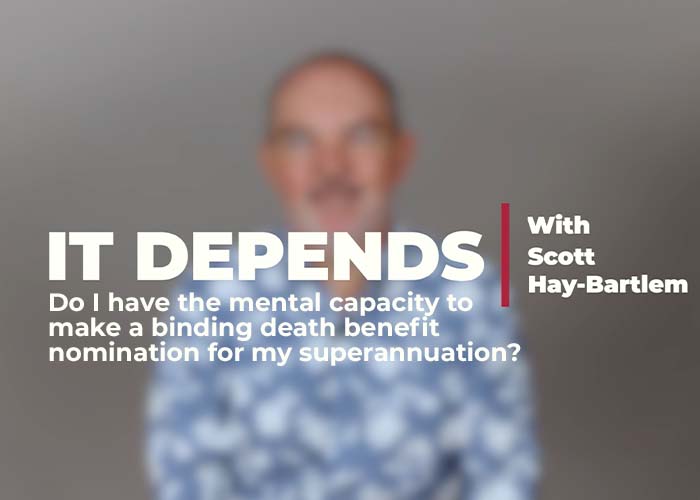Best Lawyers have released their rankings for Best Law Firms 2026 and Cooper Grace Ward has an impressive recognition in 21 practice areas. ...

In this edition of It depends, partner Scott Hay-Bartlem talks about how we know whether a person has the mental capacity to make a binding death benefit nomination for their superannuation.
Hello and welcome to this It depends, where I’m going to discuss, does someone have the mental capacity to make a binding death benefit nomination for their superannuation?
So, a binding death benefit nomination is a document that allows you to direct and specify how your superannuation is paid when you die. The form and content will depend upon your particular superannuation fund. It’s really important for some people, not important for others, bad for another set of people. An It depends on that is for a different day. One of the catches is that particularly for binding death benefit nominations in large funds, they usually lapse after three years. So, sometimes we’re having to look at renewing or remaking binding death benefit nominations later in life.
Whether someone has the mental capacity to do something is very important about whether it will be effective or not. Now the question of ‘does someone have it or not?’ is a big It depends because it depends on what it is you’re actually doing. So, to make a Will, there’s a long set of cases about testamentary capacity. You have to understand you’re signing a Will, understand your assets, who should be looked after, and there’s no undue influence. For an enduring power of attorney, you need to have mental capacity to understand the nature and effect of what you’re doing, and to be doing it freely or voluntarily.
Okay, so a binding death benefit nomination is not a Will nor an enduring power of attorney. We’ve got a recent case that the capacity to make a binding death benefit nomination is that you understand the nature and effect of what you are doing. Now, some binding death benefit nominations, very complex, some quite straightforward. And in the particular case, although the estate planning was amazingly complicated, the binding death benefit nomination was actually one of those more straightforward ones. And the person making it was found to have capacity, even though they actually died later that day and they had significant medication. So, in each case, it’s a matter of testing whether the person making the binding death benefit nomination understands what that binding death benefit nomination is doing, and its effect. Quite different to a Will or an enduring power of attorney.
If someone does not have capacity to make a binding death benefit nomination, then it won’t be effective. In some cases, an attorney, under an enduring power of attorney can make one. It will depend upon the wording of the enduring power of attorney, what the trust deed for the super fund says and what they’re trying to do. Now, if there’s any doubt, because this is an area people are challenging binding death benefit nominations, we’re going to need to get evidence that at the time of the signing, the person had capacity. A letter from a doctor about capacity will often help, but it needs to cover off specific things. Evidence from the witnesses. So, get it witnessed in front of people who can ask the right questions, and can then come back later on and give evidence about the capacity and how the person making it met the test. Now, as I said, this is an area where we’re finding more and more fights, so it’s important to get this right. If you’ve got any questions about binding death benefit nominations, capacity, enduring powers of attorney, please contact a member of our super and estates team. Thanks for watching this edition of It Depends.
This publication is for information only and is not legal advice. You should obtain advice that is specific to your circumstances and not rely on this publication as legal advice. If there are any issues you would like us to advise you on arising from this publication, please let us know.
Subscribe to our interest lists to receive legal alerts, articles, event invitations and offers.

Cooper Grace Ward acknowledges and pays respect to the past, present and future Traditional Custodians and Elders of this nation and the continuation of cultural, spiritual and educational practices of Aboriginal and Torres Strait Islander peoples.
Fast, accurate and flexible entities including companies, self-managed superannuation funds and trusts.